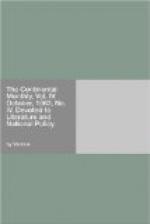When I say Augustus Myrtle sought only the intimacy of the rich and well bred, you must not suppose he was a toady, or practised obsequiously. Not at all. He mingled with his associates, assuming to be one of them—their equal. True, his want of money led to desperate economical contrivances behind the scenes, but on the stage he betrayed by no sign that affairs did not flow as smoothly with him as with his companions. In all this, he had in his mother great support and encouragement. Her relations were precisely of the stamp Augustus desired to cultivate, and this gave him many advantages. As usually happens, he found what he sought. By the aid of the associations he had formed with so much assiduity, to say nothing of his own personal recommendations, he married a nice girl, the only child of a widowed lady in the right ‘set’ and with sixty thousand dollars, besides a considerable expectancy on the mother’s decease. Shortly after, he became rector of St. Jude’s, the most exclusive ‘aristocratic’ religious establishment in New York.
At this present period, the Rev. Augustus Myrtle was but thirty-five, and, from his standing and influence, he considered it no presumption to look forward to the time when he should become bishop of the diocese.
His health was excellent, if we may except some very slight indications of weakness of the larynx, which had been the cause of his making two excursions to Europe, each of six months’ duration, which were coupled with an appropriation of twenty-five hundred dollars by his indulgent congregation to pay expenses.
* * * * *
While Mr. Myrtle and his family were still absent, Hiram had made very sensible progress in mastering the mysteries of the Episcopal form of worship, and became fully versed in certain doctrinal points, embracing all questions of what constitutes a ‘church’ and a proper ‘succession.’ His investigations were carried on under the direction of the Rev. Mr. Strang, a man of feeble mind (Mr. Myrtle was careful to have no one near him unless the contrast was to his advantage), but a worthy and conscientious person, who believed he was doing Heaven service in bringing Hiram into the fold of the true church. Hiram was again in his element as an object of religious interest. Before the rector had returned, he became very impatient to see him. It was a long while since he had been at communion, and he began to fear his hold on heaven would be weakened by so long an absence from that sacrament. Besides, he felt quite prepared and ready to be confirmed.
The Myrtles returned at last. In due time, Mrs. Bennett talked the whole matter over with Mrs. Myrtle. Hiram was represented as ’a very rich young merchant, destined to be a leading man in the city—of an ancient and honorable New England family—very desirable in the church—a cousin’—[here several sentences were uttered in a whisper, accompanied by nods and signs significant, which I shall never be able to translate]—’must secure him—ripe for it now.’




